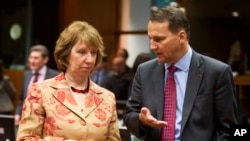PARIS —
The United States and other world powers are easing economic sanctions against Iran after international inspectors confirmed that Tehran has started to curb its most sensitive nuclear enrichment activity.
The International Atomic Energy Agency said Monday that Iran had disabled centrifuges at its Natanz and Fordow nuclear facilities that were used to enrich uranium to 20 percent. The cutback was part of a landmark November agreement Tehran reached with the world powers who are seeking to prevent it from obtaining a nuclear weapon.
The White House said it was "the first time in nearly a decade" that Tehran "has verifiably enacted measures" to trim its nuclear capability. It called the Iranian actions "an important step forward."
The European Union joined the United States in starting to ease some economic sanctions against Iran, at the start of a interim agreement to curb Iran's nuclear program.
Speaking to reporters Monday in Brussels, European Union foreign policy chief Catherine Ashton said the coming months will be crucial in reaching a comprehensive agreement with Iran on its nuclear program. But she hailed the interim deal that went into effect Monday, in which Iran scales back its most worrying nuclear activities over a six-month period.
"It is an important first step, but more work will be needed in order to fully address the international community's concerns regarding the peaceful nature of the Iranian nuclear program," said Ashton.
Ashton says talks begin next month on reaching a final deal between Iran and world powers: the United States, Britain, France, Germany, Russia, China and the European Union. The international community is worried Iran is trying to build nuclear weapons. Tehran says its nuclear activities are for purely peaceful purposes.
The International Atomic Energy Agency confirmed that under the interim deal, Iran had disabled centrifuges at two nuclear facilities that enrich uranium.
In response, the European Union will begin lifting restrictions in areas like Iran's petrochemicals industry, on metals trading and on money transfers linked to trade and remittance payments. The United States is also easing economic sanctions. The White House said Iran's actions amounted to an 'important step forward."
British Foreign Secretary William Hague also hailed Tehran's response a "welcome and important step."
"It is important that other sanctions are maintained and the pressure is maintained for a comprehensive and final settlement of the Iranian nuclear issue," said Hague.
The easing of restrictions is good news for Tehran's economy, which has been battered by international sanctions. The measures take effect immediately.
The International Atomic Energy Agency said Monday that Iran had disabled centrifuges at its Natanz and Fordow nuclear facilities that were used to enrich uranium to 20 percent. The cutback was part of a landmark November agreement Tehran reached with the world powers who are seeking to prevent it from obtaining a nuclear weapon.
The White House said it was "the first time in nearly a decade" that Tehran "has verifiably enacted measures" to trim its nuclear capability. It called the Iranian actions "an important step forward."
The European Union joined the United States in starting to ease some economic sanctions against Iran, at the start of a interim agreement to curb Iran's nuclear program.
Speaking to reporters Monday in Brussels, European Union foreign policy chief Catherine Ashton said the coming months will be crucial in reaching a comprehensive agreement with Iran on its nuclear program. But she hailed the interim deal that went into effect Monday, in which Iran scales back its most worrying nuclear activities over a six-month period.
"It is an important first step, but more work will be needed in order to fully address the international community's concerns regarding the peaceful nature of the Iranian nuclear program," said Ashton.
Ashton says talks begin next month on reaching a final deal between Iran and world powers: the United States, Britain, France, Germany, Russia, China and the European Union. The international community is worried Iran is trying to build nuclear weapons. Tehran says its nuclear activities are for purely peaceful purposes.
The International Atomic Energy Agency confirmed that under the interim deal, Iran had disabled centrifuges at two nuclear facilities that enrich uranium.
In response, the European Union will begin lifting restrictions in areas like Iran's petrochemicals industry, on metals trading and on money transfers linked to trade and remittance payments. The United States is also easing economic sanctions. The White House said Iran's actions amounted to an 'important step forward."
British Foreign Secretary William Hague also hailed Tehran's response a "welcome and important step."
"It is important that other sanctions are maintained and the pressure is maintained for a comprehensive and final settlement of the Iranian nuclear issue," said Hague.
The easing of restrictions is good news for Tehran's economy, which has been battered by international sanctions. The measures take effect immediately.





